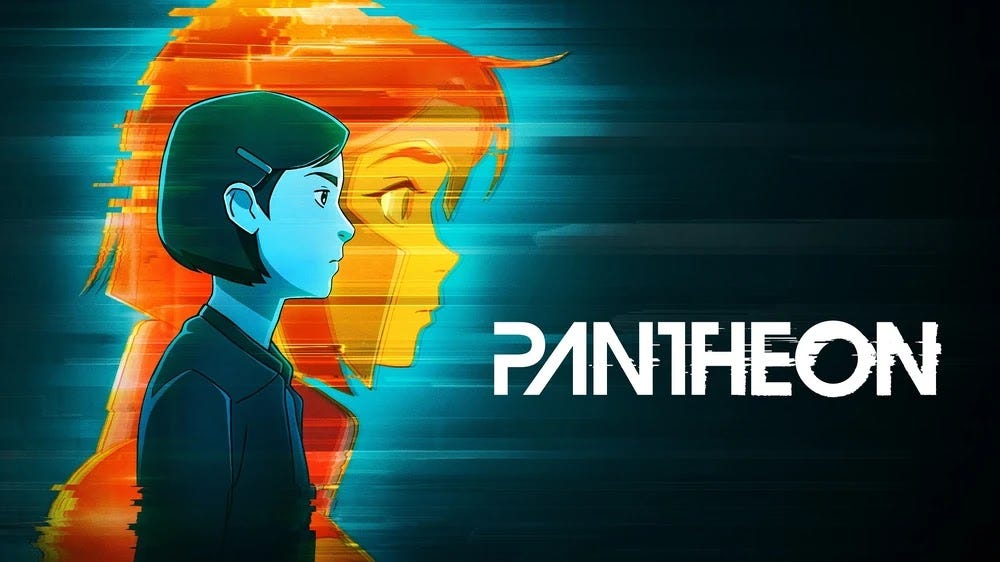Navigating the Ship of Theseus
As anyone who knows me well can attest, I am a BIG fan of the idea of whole brain emulation, uploaded intelligence, and personal universes. To me, that seems like the most reasonable direction for humanity to evolve.
One of my favorite animated shows, Pantheon, and one of my favorite book series, The Bobiverse, explore this extensively (highly, HIGHLY recommend both).
The thing is, when I talk to most people about digitizing a mind, I routinely hear a dismissive, negative take, something to the effect of “that sounds dystopian” or “I would never do that” or “that wouldn’t be me, it would be a copy at best, or a tortured ghost at worst.”
And sure, it’s not that such a technology would come with no risks. All tech is a double-edged sword, as humanity well knows, and the potential risks of such tech have been explored in both humorous and terrifying fashion.
But technology tends to make life better, not worse. I think this will do the same.
Since I have now had to debate this with many different people, and really don’t like repeating myself, it’s time to write a post to point folks to instead of rehashing the same points ad nauseum 😎
Who is this “you” of which you speak?
If you aren’t already familiar, the Ship of Theseus is a thought experiment that asks:
If a ship's parts are replaced one by one over time, is it still the same ship? At what point, if any, does it stop being the same ship? If the removed parts are reassembled into a new ship, which is the "real" Ship of Theseus?
So when I ask “what is this ‘you’ of which you speak,” you might be tempted to point to your body or your head, which is as good a place to start as any I suppose.
The thing is, as with the Ship of Theseus, your body and mind aren’t static things.
For starters, something like 50% of the cells within the space you call your body aren’t even your own cells, they are viruses, bacteria, yeast, parasites, and all sorts of “not you” things (that, funny enough, “you” couldn’t survive without).
As an aside, it’s a pretty funny mental image when you realize the human body is essentially a donut, and the tube from your mouth to your butthole is actually exterior to “you” 🤣
Next, of the cells that are actually “you,” the vast majority are regularly destroyed and replaced, ranging anywhere from a few days to a decade, depending on the type of cell.
There ARE some cells that don’t change over (or do so very slowly/rarely), most interesting of which are your neurons in your brain, spinal column, and gut. (Also a few others, eye lens cells, heart muscle cells, some skeletal muscle cells, and female eggs.)
Out of all of those, the neurons are the most interesting…while we do not understand yet what consciousness is, or even IF it is a singular “thing” in the typical sense (I suspect it is not), it is not unreasonable to hypothesize that the experience we call consciousness is A. generated by the brain, and thus B. localized and derived from a specific configuration of “hardware and software.”
As far as we can tell, consciousness can be turned off via the brain (the claustrum, anesthetics; this is debated though, as some think it only turns of memory formation), and if “you” die your consciousness certainly seems to end (again, much disagreement here, but we have no tested, validated, replicable data one way or the other).
So, for the sake of this discussion, sticking solely to what we can actually observe, let’s assume that consciousness is a system/process that is generated by those neurons that don’t turn over.
Reasonable?
Those neurons of course are no small thing. 100 billion neurons, 100 trillion synaptic connections…you’re quite a machine! All of your memories, your personality, everything that makes up the mental concept of you, seems to be contained in those neurons.
But that brain is still a FINITE machine, as far as we know.
Infinity is a fun mathematical concept, but it is a paradoxical one that doesn’t appear to play out in reality, so again, the brain is almost certainly finite.
And while there are theories that the brain has a quantum component (which might be valid, depending on the fundamental nature of reality, TBD), even if it does it’s still very likely a localized device (your brain) interfacing with the universal quantum field in some way.
And even if there IS a universal quantum field, everything would have to interact with it by definition (universal), so that doesn’t add much to this argument either way, though it does make for an interesting rabbit hole to explore regarding the concepts of universal consciousness and oneness.
So, we have:
Consciousness appears to be a system / process
It is likely generated by the neurons in your body, which don’t turn over
Thus it is processed by *finite* hardware and software
All of this is to say, with sufficient scanning technology and the right hardware and software upon which to run it, there is no reason to believe that we couldn’t make an exact replica of someone’s brain, spinal column, gut—all their neurons—in silico.
And frankly if we can do that, we could probably just replicate their whole body.
Original vs. Copy
So, let’s assume then that with advances in scanning technology, hardware, and software, we can in fact make a copy of a mind, and run it on a computer of some sort.
Further, let’s say we elected to not just copy the mind, but your entire body, down to the tiniest detail. It has all your memories, all your senses; it looks, acts, and talks just like you.
And to the copy, there’s no reason to believe that, if it IS a faithful copy, that it wouldn’t A. have a sense of perfect continuity, and B. would BE you in every way that mattered (both to itself, and to those interacting with it).
I came across this today, which, while tongue in cheek, makes the point:
Let’s take it one step further…what if, at the moment of being copied, the original you was destroyed? Star Trek explored this via their transporter technology, effectively scanning, breaking down, and rebuilding someone at the other end. Obviously their actual matter of which they were composed couldn’t traverse such distances instantly, so even though the person appearing on the transporter pad may have been the same person in every way that mattered, they weren’t composed of the exact same physical material as the “original,” just the configuration.
Did that matter? Should that matter?
I would personally say no. In the same way that my body breaks down and rebuilds constantly, even acknowledging that some parts don’t go through that process, I don’t ever feel like some part of me that breaks down and rebuilds is no longer ME.
I can’t speak for you, but my continuity isn’t perceived as a physical configuration per se, but in my sense of self, my memories, and my sense of continuity with all of the above.
I feel like me because I look like me, sound like me, and have my memories.
But wait, you might say, what about a soul? Some “thing” that is uniquely you and can’t possibly be copied?
🤦♂️
There is ZERO evidence for a “soul.” There is no evidence that there’s some magical aspect of “you” that can’t be copied (again, as far as we know).
You could make an argument around the no-cloning theorem of course, but that itself is quite speculative, hampered by the measurement problem (as is much in quantum physics), applies only to unknown/unmeasured particles, and also presupposes some aspect of what makes you “you” is in fact quantum (unknown).
If the original “you” survives, then of course you would immediately begin to diverge from the copy, thus becoming different in all manner of ways—and that replicative drift would then make you more akin to identical twins—but it only addresses what happens AFTER copying, not at the moment of copying.
For all intents and purposes, the words original and copy in this context, and the argument that it should matter, is rather silly and likely rooted in primitive emotions and/or superstitious beliefs. (Yes, that’s dismissive, but I detest both fear and religion, so, meh.)
Why does this matter?
Good question! I already mentioned and linked to a paper on personal universes at the beginning of this article (highly recommend reading that), and I’ve explored why this matters in my post on Apotheosis, but I’ll give a quick summary to wrap things up.
In short, these meat suits we’re all so attached to are still, both evolutionarily and in terms of capabilities, primitive. Incredibly primitive.
We are limited in more ways than I can articulate—subject to natural laws, in need of food, only capable of processing so many calories, with a brain that can only process a very limited bitrate in awareness, that generates numerous errors, requires rest—soooo many things.
But in a virtual environment, you could eliminate most of these constraints. You could systematically improve yourself, have perfect memory, process things millions of times faster, make time (for you) move faster or slower, have near infinite control over your personal universe and the experiences within it, make backups or copies to assist you, and be functionally immortal.
You could, as an uploaded mind, be the god of your own universe.
Given the incredibly massive upside of mind uploading, and the direction I suspect things are trending, even if I believed that a copy of me would be almost identical but not *exactly* the same as original me, and even if the only way to make that copy was to destroy the original, I’d still do it without batting an eye. (Assuming the tech was tested and safe, of course…no qntm Lena or Roko’s Basilisk scenarios please lol.)
I simply find the concept of You or I so squishy, so fluid and malleable, that attaching rigidly to one specific configuration of it is foolish. As are arguments around what is or isn’t real (if you can experience it, form memories around it, it is real in every sense of the word.)
I can very, very clearly see technological development leading to this possibility.
From advances in AI, brain computer interfaces, virtual reality, and computational research, I think it is exceptionally likely that we’ll be able to do something like this within a decade, two at most.
Yes, that soon.
In just 10, maybe 20 years, YOU might need to grapple with this concept and make a choice, possibly the most important choice you will ever make. To upload, or not to upload?
How will you choose to live? And why?
—
If you found this interesting, you might enjoy this short story by Greg Egan, Learning to Be Me. (I only found this after writing the above post, but of course Greg Egan would have written about this 30 years ago lol.)





